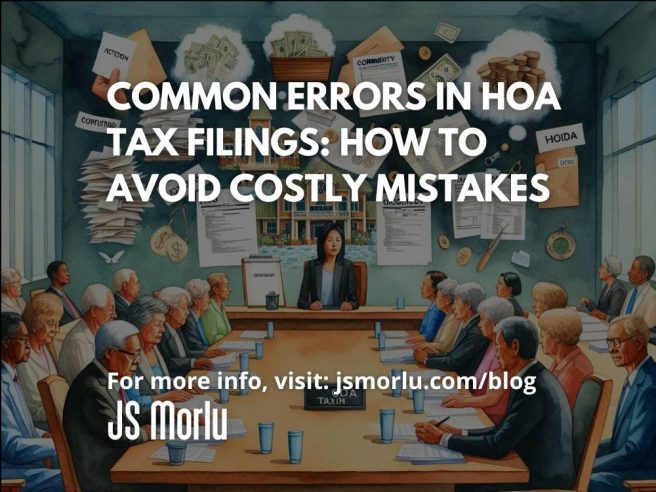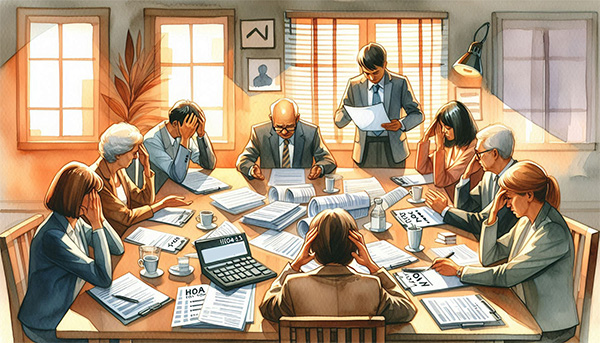By: John S. Morlu II, CPA
Homeowners Associations (HOAs) are unique entities with distinct tax requirements. While they often operate as nonprofit organizations under state law, the IRS treats them as businesses, requiring annual tax filings. Unfortunately, errors in HOA tax filings are common, often leading to penalties, audits, or overpayment. This article delves into the most frequent mistakes made by HOAs, why they occur, and how to prevent them.
1. Failing to File a Tax Return
The Error:
Some HOAs mistakenly believe they are exempt from filing taxes because they operate as nonprofit corporations under state law. However, the IRS requires all HOAs to file an annual tax return, regardless of whether they owe taxes.
IRS Insight:
According to the IRS, an HOA is considered a taxable entity unless it qualifies for specific exemptions under Section 501(c) or Section 528. Failure to file can result in fines of 5% of the unpaid tax per month, up to a maximum of 25%.
Interesting Tidbit:
Nonprofit status under state law does not equate to federal tax exemption. Many HOAs incorrectly assume their state classification applies to IRS rules.
How to Avoid:
- Always file Form 1120 or Form 1120-H annually.
- Consult with a CPA familiar with HOA taxation to ensure compliance.
2. Filing the Wrong Tax Form
The Error:
HOAs often file the incorrect tax form, either Form 1120 (Corporate Tax Return) or Form 1120-H (HOA Tax Return), without fully understanding their implications.
IRS Insight:
- Form 1120-H is designed specifically for HOAs and allows them to exclude exempt-function income (dues, fees, assessments) from taxable income.
- Form 1120 may allow more deductions but requires detailed reporting and carries a higher risk of IRS scrutiny.
Interesting Tidbit:
HOAs can switch between Form 1120 and Form 1120-H each year to choose the most tax-advantageous option, but they must meet specific eligibility requirements for Form 1120-H.
How to Avoid:
- Evaluate both forms annually to determine which minimizes your HOA’s tax liability.
- File Form 1120-H by default unless the financial benefits of Form 1120 outweigh its complexities.
3. Misclassifying Income
The Error:
Improperly categorizing income is one of the most common mistakes. HOAs often misclassify non-exempt income (e.g., rental income, interest) as exempt-function income (dues, fees).
IRS Definitions:
- Exempt-Function Income: Revenue from dues, fees, or assessments used for association operations.
- Non-Exempt Income: Income from investments, rentals, or unrelated activities.
IRS Insight:
Misclassifying non-exempt income as exempt can lead to underreported taxable income, triggering penalties or audits.
Interesting Tidbit:
A 2021 IRS compliance report found that 25% of audited HOAs had errors in income classification, resulting in back taxes and fines.
How to Avoid:
- Maintain accurate records separating exempt and non-exempt income.
- Use HOA-specific accounting software to track revenue streams.
4. Deducting Non-Allowable Expenses
The Error:
Some HOAs deduct expenses that are not directly related to taxable income, such as general maintenance costs funded by exempt-function income.
IRS Rules:
Under Form 1120-H, only expenses tied to generating taxable income (e.g., rental property maintenance) are deductible.
Interesting Tidbit:
Many HOAs mistakenly believe all expenses are deductible, but only those directly tied to taxable income are eligible.
How to Avoid:
- Review IRS guidelines for allowable deductions.
- Consult a CPA to ensure deductions comply with IRS regulations.
5. Incomplete or Incorrect Filings
The Error:
Simple errors, such as incorrect Taxpayer Identification Numbers (TINs) or missing income details, can delay processing and increase the risk of audits.
IRS Insight:
HOAs with incomplete or inaccurate filings are flagged for further review, potentially leading to penalties.
Interesting Tidbit:
A missing TIN is one of the top 10 reasons for IRS processing delays across all tax filings.
How to Avoid:
- Double-check all entries before submission.
- Use professional tax preparation software or hire a CPA for accuracy.
6. Missing Deadlines
The Error:
Late filings or payments are common and result in penalties and interest.
IRS Deadlines:
- Most HOAs must file by April 15.
- HOAs with a fiscal year ending June 30 must file by September 15.
IRS Penalties:
Failure to file on time incurs a penalty of 5% of the unpaid tax per month, up to a maximum of 25%. Late payments accrue interest daily.
Interesting Tidbit:
The IRS collected over $1 billion in late-filing penalties from small businesses and organizations, including HOAs, in 2022.
How to Avoid:
- Set calendar reminders for filing deadlines.
- File an extension (Form 7004) if you need additional time to prepare your return.
7. Poor Record Keeping
The Error:
Inadequate financial records make it difficult to substantiate income and expenses during an IRS audit.
IRS Rules:
The IRS requires organizations, including HOAs, to maintain records for at least seven years.
Interesting Tidbit:
According to IRS studies, poor record-keeping is a contributing factor in over 60% of HOA audit findings.
How to Avoid:
- Implement a robust accounting system.
- Store financial documents securely and ensure they are easily accessible.
8. Ignoring State Tax Requirements
The Error:
HOAs often overlook state tax filing obligations, which can vary significantly by jurisdiction.
IRS Insight:
While federal filing is mandatory, state requirements depend on local laws. Some states, such as California, require additional filings, while others may not.
How to Avoid:
- Research state-specific filing requirements.
- Partner with a CPA familiar with local tax laws.
9. Failing to Elect Section 528
The Error:
To benefit from IRS Section 528, HOAs must actively elect to operate under this provision by filing Form 1120-H annually.
IRS Rules:
HOAs failing to make this election are taxed as standard corporations under Form 1120, which may result in higher taxes.
Interesting Tidbit:
Once Form 1120-H is filed, the election cannot be revoked for that year without IRS approval.
How to Avoid:
- File Form 1120-H on time to secure the election.
- Educate board members on the benefits of Section 528 compliance.
10. Overlooking Professional Help
The Error:
Some HOAs try to handle taxes in-house, resulting in errors due to a lack of specialized knowledge.
IRS Insight:
The IRS regularly flags HOAs for common errors that could have been avoided with professional assistance.
Interesting Tidbit:
HOAs that hire CPAs for tax preparation are 40% less likely to face penalties or audits, according to the Community Associations Institute.
How to Avoid:
- Engage a CPA experienced in HOA taxation.
- Schedule annual tax reviews to ensure compliance.
Conclusion: Accuracy and Compliance Are Key
HOA tax filings can be complex, but understanding common errors can help your association avoid costly mistakes. By filing the correct forms, meeting deadlines, maintaining accurate records, and seeking professional guidance, your HOA can stay compliant and financially secure.
Pro Tip: Start preparing taxes early in the year to address potential issues and ensure timely submission. A proactive approach saves time, reduces stress, and protects your HOA from unnecessary penalties.
📖 Read next: Common Mistakes Found in HOA Audits and Financial Reviews: How to Avoid Them
Author: John S. Morlu II, CPA
John S. Morlu II, CPA, is the CEO and Chief Strategist of JS Morlu, a globally acclaimed public accounting and management consulting powerhouse. With his visionary leadership, JS Morlu has redefined industries, pioneering cutting-edge technologies across B2B, B2C, P2P, and B2G landscapes.
The firm’s groundbreaking innovations include:
• ReckSoft (www.ReckSoft.com): AI-driven reconciliation software revolutionizing financial accuracy and efficiency.
• FinovatePro (www.FinovatePro.com): Advanced cloud accounting solutions empowering businesses to thrive in the digital age.
• Fixaars (www.fixaars.com): A global handyman platform reshaping service delivery and setting new benchmarks in convenience and reliability.
Under his strategic vision, JS Morlu continues to set the gold standard for technological excellence, efficiency, and transformative solutions.
JS Morlu LLC is a top-tier accounting firm based in Woodbridge, Virginia, with a team of highly experienced and qualified CPAs and business advisors. We are dedicated to providing comprehensive accounting, tax, and business advisory services to clients throughout the Washington, D.C. Metro Area and the surrounding regions. With over a decade of experience, we have cultivated a deep understanding of our clients’ needs and aspirations. We recognize that our clients seek more than just value-added accounting services; they seek a trusted partner who can guide them towards achieving their business goals and personal financial well-being.
Talk to us || What our clients says about us





